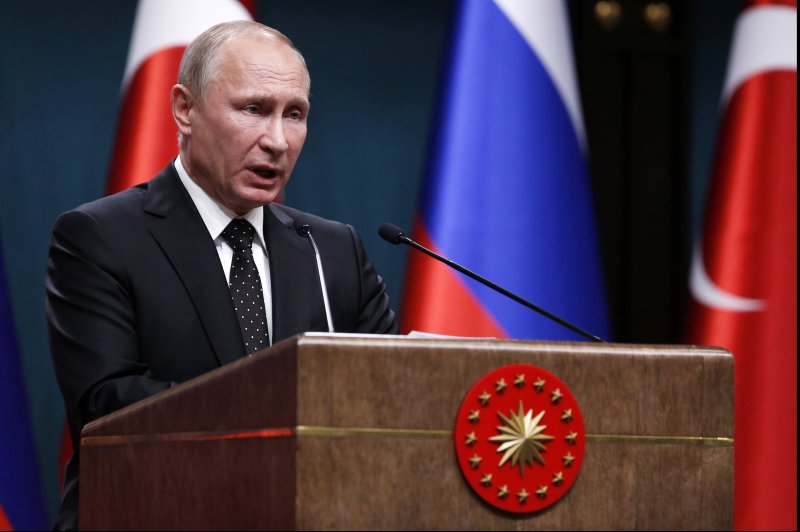Russian President Vladimir Putin has good relations not just with all the major actors in the Israeli-Palestinian arena -- Fatah, Hamas and the Netanyahu government -- but with all Middle Eastern governments. File Photo by Tumay Berkin/EPA-EFE
Jan. 8 (UPI) -- U.S. President Donald Trump has self-confidently proclaimed that he can succeed where previous American presidents have failed in bringing about an Israeli-Palestinian peace settlement. However, his recognition of Jerusalem as Israel's capital and announcement that the U.S. Embassy in Israel will move there have weakened his ability to do this.
With the Palestinians also claiming Jerusalem as the capital of a future Palestinian state, Trump's definitively backing Israel's claim to the entire city -- in defiance of past American policy -- undermined confidence worldwide that he will work for an Israeli-Palestinian peace settlement acceptable to the Palestinians.
If Trump cannot or will not do this, can Russian President Vladimir Putin?
Despite his poor relations with the West, there are strong reasons why many, including Putin, see Moscow as a better candidate than Washington for mediating between Israel and the Palestinians. Unlike the United States, Putin has good relations not just with all the major actors in the Israeli-Palestinian arena -- Fatah, Hamas and the Netanyahu government -- but with all Middle Eastern governments.
Further, Moscow indicated last April that it was willing to consider West Jerusalem as the capital of Israel and East Jerusalem as the capital of a future Palestinian state, demonstrating a much greater desire to accommodate both sides than the Trump administration.
An ability to talk with opposing sides in a conflict, though, does not necessarily enable an outside mediator to settle a conflict. In addition to being able to talk with them all, an outside party must be able to either persuade or coerce opposing parties to make concessions to the other side. During the Camp David talks between Israel and Egypt in the 1970s, Washington's ability to provide massive assistance to both sides -- which continues to this day -- played an important role in getting them both to reach a settlement.
Thus, even though Putin can talk with all sides in the Israeli-Palestinian conflict and is seen by the Palestinians and their supporters as more viable than Trump as a mediator, this does not mean that he can broker peace between them. Especially given the economic constraints from Western sanctions that Russia faces, Putin is simply not in position to offer anything to Israeli Prime Minister Benjamin Netanyahu that would induce him to accept a Palestinian state, much less East Jerusalem as its capital.
Similarly, it is doubtful he can offer anything to the Palestinians that would induce them to accept the loss of East Jerusalem in exchange for the establishment of a Palestinian state in the West Bank and Gaza (assuming Israel would agree to even that).
Further, Putin cannot credibly threaten to impose unbearably painful costs on either (much less both) if they do not accept what Moscow deems as a reasonable settlement. Any Russian threat against Israel would simply drive it closer to the United States and if Israeli forces have been unable to compel the Palestinians to back down, it is difficult to see how Russia could do so. Not only would trying to do so be unproductive, it would hurt Moscow's efforts to portray itself as friendlier than America to the Arab and Muslim worlds.
Moscow's inability to persuade or coerce opposing parties to reach a peace settlement severely limits its ability to bring about an Israeli-Palestinian peace settlement. Yet even though he is offering Russian mediation, Putin may well understand that his ability to bring about such a settlement is extremely weak.
Why, then, would Putin offer Russian mediation if he knows that it is unlikely to succeed?
Putin may be less interested in bringing about an Israeli-Palestinian settlement than in portraying himself as more "even-handed" than Trump. For even if Putin is seen to try but fail to negotiate an Israeli-Palestinian settlement, this outcome will be widely blamed by Arabs, Muslims and many others on U.S. support for Israel and not on Putin.
At the same time, a Russian-sponsored mediation process that does not result in Israel having to make concessions to the Palestinians preserves Russia's economic and security cooperation with Israel.
In other words, offering himself as an Israeli-Palestinian mediator holds out the prospect that Putin can gain even if he fails to make any progress. Indeed, his just trying to mediate between Israelis and Palestinians when Trump is so strongly supportive of Israel may bolster Russia's image as a responsible power and America's as an irresponsible one.
This is an outcome that Putin would be very satisfied with.
Mark N. Katz, a professor of government and politics at George Mason University, is currently a visiting senior fellow at the Finnish Institute of International Affairs. This article originally appeared at The Arab Weekly.















